 |
| Hey look, it's life! |
6. Chromista - These are dumb little algae things that, for some reason, aren't classified as plants despite the fact that other types of algae do count as plants. The supposed reason why they aren't plants is because they are "protozoans whose plastids contain chlorophyll c." Whatever that means. I dunno. Just sounds like a tiny plant to me. But I'm not a biologist.
5. Protozoa - These are single-celled eukaryotes, either free-living or parasitic, which feed on organic matter such as other microorganisms or organic tissues and debris. Historically, protozoa were thought to be "one-celled animals", because they had animal-like behaviors, including the ability to move around and prey on other organisms, and lack a cell wall (unlike plants). These lil' guys carry a whole bunch of diseases, so fuck em!
4. Bacteria - You might view this kingdom of life as "bad," especially the current global pandemic. But remember, there are what we think of as "good" bacteria, and also what we think of as "bad" bacteria. Fun fact: nearly all animal life is dependent on bacteria for survival, because as only bacteria (and some archaea, which I'll get to in a moment) possess the genes and enzymes necessary to synthesize vitamin B12, an essential vitamin to support animal life. So what are the "archaea" that I mentioned? Well, they're so closely related to bacteria that people can't agree whether or not they are a different kingdom. Once they were considered as part of the same kingdom, together known as "monera." Even when they were separated out by some, another name for archaea was "archaebacteria." But nobody can agree, so I'm going to call them both bacteria. Whatever.
 |
| 1-Up! |
2. Plantae - Plants are mainly multicellular, predominantly photosynthetic eukaryotes. They have historically always been one of the kingdoms of life, dating back to Linnaeus's vegetable kingdom. Or even further back, really. In Ye Olde Greek times, Aristotle and Theophrastus divided all of life into animal and plant. All current definitions of Plantae exclude fungi (and some algae, as explained above), and are your photosynthesizing "green" plants that contain chlorophyll. This includes your flowering plants, gymnosperms, ferns, worts, mosses and green algae.
1. Animalia - I mean, considering that I am an animal, this would obviously be #1! What makes an animal an animal? Well, with very few exceptions, an animal will always be able to consume organic material, breathe oxygen, have mobility, reproduce sexually, and grow from a hollow sphere of cells (AKA the blastula) during embryonic development. Yes, you, human being, are an animal. Humans are not something different than animals. You are in the same damn kingdom of life as bluejays, crabs, starfish, horses, sharks, spiders, delicious moo cows, and all of that shit. Yeah. So enjoy being an animal. It's much better than being a stupid Chromista.
_Naggar%2C_Himachal_Pradesh%2C_2013_(cropped).JPG/800px-Ultramarine_Flycatcher_(Ficedula_superciliaris)_Naggar%2C_Himachal_Pradesh%2C_2013_(cropped).JPG) |
| Animal eating an animal. Double example! |
No comments:
Post a Comment